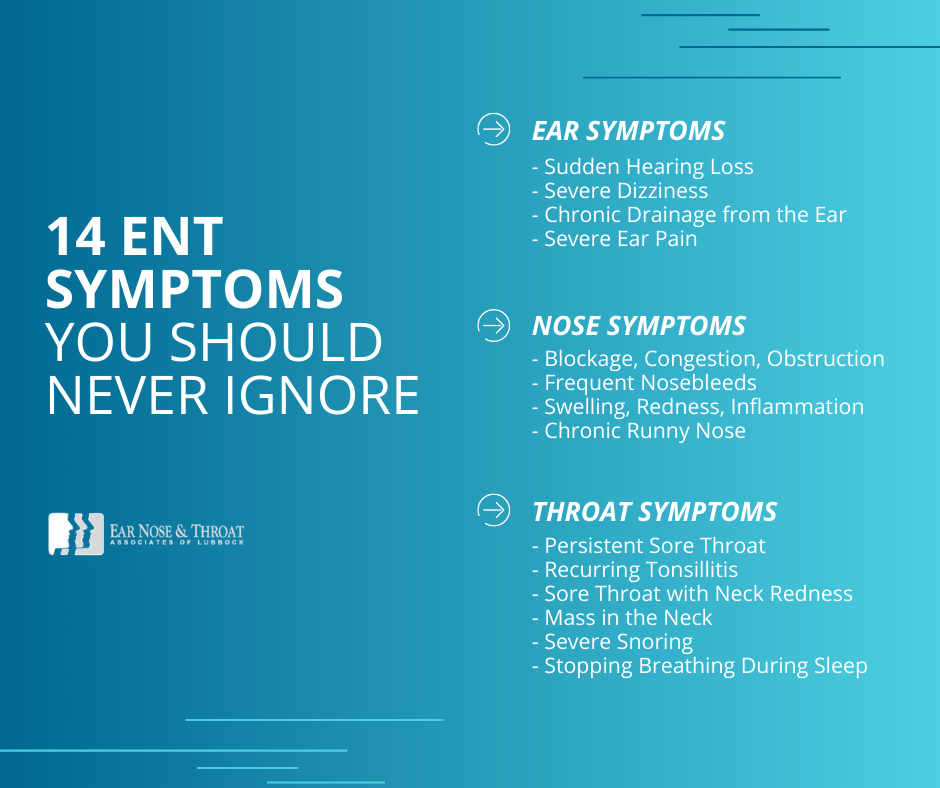Ask a Surgeon: What ENT Symptoms Shouldn’t I Ignore?

We’ve all done it. You have an unusual symptom that you’ve never experienced before. You ask a spouse or a friend what they think. Ultimately, you pick up your phone and turn to the one friend who always has your back (especially at 2 a.m.): Dr. Google.
Sometimes, Dr. Google is helpful. But sometimes, he confirms your worst fears and even suggests other fears you’d never thought of.
New symptoms can be scary, especially in your ears, nose or throat. But while there’s a lot of great information online, many minor ENT illnesses can have the same symptoms as major ones, so it’s hard to know what’s going on through symptoms alone.
The surest way to discover the source of your problem is to see an ENT doctor. ENTs have the special training and resources to see beyond your symptoms and identify their root cause. And if the diagnosis turns out to be something minor, you then have the reassurance from a medical professional that your symptom really isn’t anything to worry about.
So how do you know when you should see an ENT doctor? Here are a few ENT symptoms that you shouldn’t ignore, and why it’s important to get them checked out.

Ear Symptoms You Shouldn’t Ignore
Sudden Hearing Loss
Unlike the gradual hearing loss many experience as they age, sudden hearing loss could indicate a more serious problem. If you wake up one morning with a noticeable reduction in hearing, you should see an ENT doctor quickly.
The cause of sudden-onset hearing loss could be as simple as wax blocking your ear canal. Or it could be nerve-related, which — while more serious than a simple wax buildup — is treatable with prescription steroids.
Severe Dizziness
Vertigo, or severe dizziness, is another sign that something isn’t right. Vertigo can originate in the inner ear, but the causes vary.
If you’re experiencing severe vertigo, you should see an ENT doctor to rule out a more serious cause for your dizziness, such as a stroke. (And we know that time is of the essence with a stroke.)
Chronic Drainage from the Ear
Often, drainage from the ear is simply wax buildup making its way out of the body. Some drainage is also normal if you have an ear tube in place.
But if you’re having a significant amount of ear drainage that lasts more than a week, or if you have an ear infection that isn’t responding to drops or other medications prescribed by your primary care doctor, it’s time to contact an ENT doctor for a closer look.
While some drainage from the ear is normal, chronic drainage can indicate a serious infection or a surgical problem.
Severe Ear Pain
And of course, you should seek medical help any time you experience severe ear pain. Pain is a sign that something isn’t right!
A variety of minor ailments can cause ear pain, such as swimmer’s ear and eustachian tube dysfunction. But extreme pain could indicate a serious ear problem, a throat issue that’s referring pain to the ear, or a deeper neurological concern.
Nose Symptoms You Shouldn’t Ignore
Nasal Blockage, Congestion or Obstruction
The vast majority of nasal congestion cases are due to viral illnesses. It’s rare, but ongoing congestion could also be a sign of a more serious infection. And, rarely, a nasal blockage or obstruction could be a tumor. A nasal polyp is also a possibility here.
Frequent Nosebleeds
Unless you’ve experienced an injury, the occasional nosebleed is fairly harmless. But recurring or frequent nosebleeds warrant a trip to the doctor. The bleeding could be harmless, or it could result from an infection or tumor.
Swelling, Redness, Inflammation or Tenderness of the Nose
Your nose may become a little puffy when you’ve been blowing it a lot, like with a cold or allergies. But any swelling and redness that’s also accompanied by a lot of inflammation and tenderness could be a sign of a very serious infection that needs to be seen in the emergency room.
Chronic Runny Nose
A chronic runny nose doesn’t necessarily warrant you dropping everything to run to the doctor. Most of the time, this ENT symptom is due to environmental allergies. But while this isn’t usually an emergency, you don’t have to resign yourself to living with a chronic runny nose!
Environmental and seasonal allergies are common and can be treated with relative ease.
Throat Symptoms You Shouldn’t Ignore
Persistent Sore Throat
A sore throat is usually due to viral or bacterial illness. Strep throat is a very common cause of persistent sore throat. But if your throat pain persists despite taking the prescribed antibiotics, that’s a sign that you should seek further medical attention.
Though rare, persistent sore throat can be a symptom of throat cancer. Despite the common belief that throat cancer only affects smokers, we’re seeing it increasingly with younger and younger non-smoking patients, mostly due to human papillomavirus (HPV) infections.
Recurring Tonsillitis
We define recurrent tonsillitis as seven infections in one year, five infections per year for two years in a row, or three infections per year for the past three years.
Any recurrent throat infection can be a sign of a more severe infection that your prescription antibiotics aren’t addressing. You may even want to discuss a tonsillectomy with your doctor.
Sore Throat with Neck Redness
Any redness of the neck that goes along with a sore throat needs to be investigated by a physician right away, as it’s a sign that an infection may have spread to your neck. This requires immediate medical intervention to keep the infection from spreading further.
Mass in the Neck
Any type of mass in the neck also deserves immediate attention. This could be thyroid-related, or it could be a lymph node, which may indicate a serious problem such as cancer. It could also be a number of different types of tumors. “Better safe than sorry” is definitely the motto to live by if you discover a lump or mass in your neck.
Severe Snoring or Stopping Breathing During Sleep
Snoring isn’t always a sign that something is seriously wrong. But if it’s severe, or if you stop breathing in your sleep, you might be dealing with sleep apnea. And sleep apnea can affect your daily life more than you realize!
Even if your snoring isn’t a serious concern, it could be fairly easy to correct by addressing the root cause. Depending on the cause of your snoring, treatment might involve a tonsillectomy, CPAP machine or Inspire procedure.
Don’t Go It Alone!
Telemedicine has been a boon to the medical community, especially during the height of the COVID-19 pandemic. Unfortunately, most ear, nose, and throat concerns require a more hands-on approach for diagnosis and care. ENT doctors can’t clean out earwax over the phone or see into your nose on a video call! In person, though, they can use various lights and scopes to identify the source of your problem and get you the treatment you need.
We want to stress that most of the serious illnesses we’ve listed above are rare. But it’s important to seek medical advice beyond what Dr. Google can provide to rule these conditions out.
So while you can treat lots of minor injuries and illnesses with home remedies, if you’re experiencing any of the symptoms mentioned above, give ENT Associates of Lubbock a call.
Dr. Scolaro is a board-certified Otolaryngologist servicing the South Plains area. He has been practicing in Lubbock since 1990 and has earned a reputation as a skilled and experienced surgeon. He currently serves as the Medical Director for Covenant High Plains Surgery Center campuses, is a member of Covenant Health Partners and is an adjunct faculty professor for Texas Tech University Health Sciences Center School of Medicine. Learn more about Dr. Scolaro.








